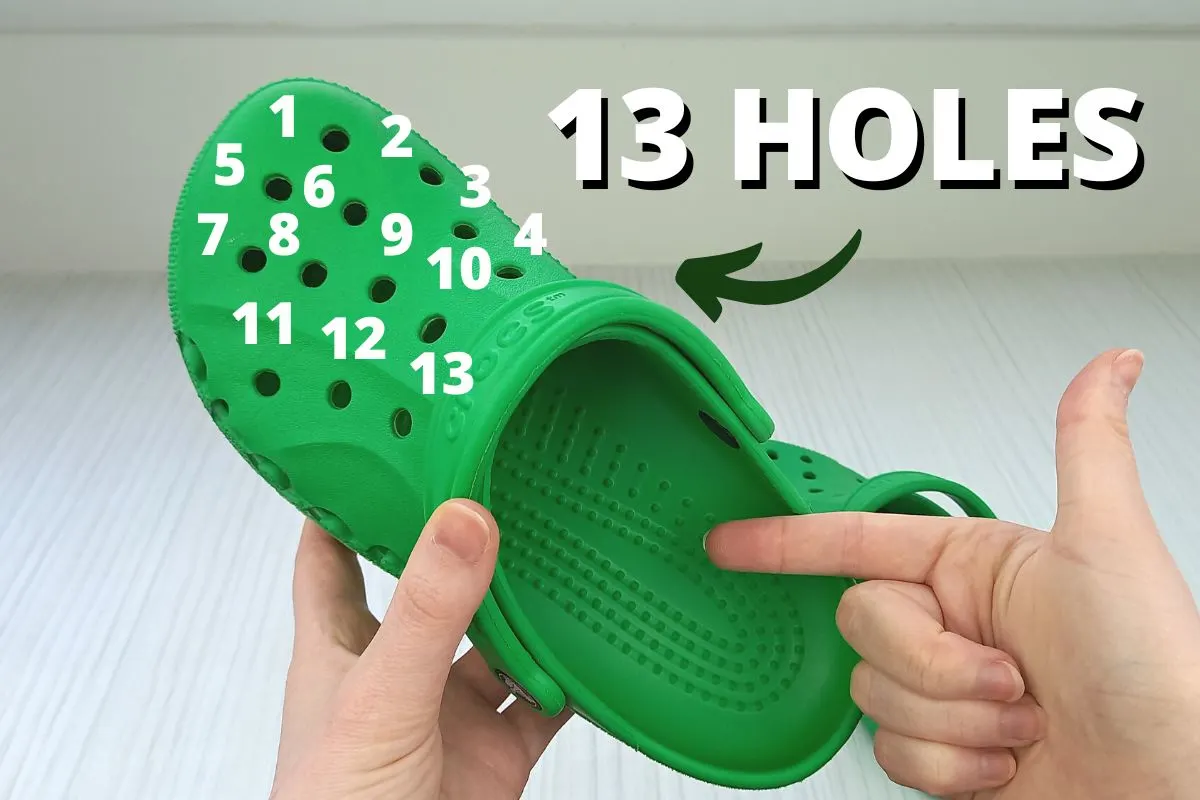It’s important to know whether or not Crocs are closed toe shoes before purchasing a pair for work in a medical or hospitality profession, gardening, lab work, or for everyday wear if you are looking for toe protection.
In this article I will be discussing whether or not Crocs qualify as closed toe shoes, backed up with safety information from lab safety documents and Law Insider. I’ll also be discussing which Crocs styles pass or fail.

*This page may contain affiliate links. As an Amazon Associate I earn from qualifying purchases at no additional cost to you. Learn More.
Are Crocs Closed Toe Shoes?
Crocs are not considered closed toe shoes from a formal health and safety perspective. This is due to the 13 holes in the top of the classic Crocs design. Closed toe shoes should cover the foot fully.
It should be noted however that you can actually purchase closed toe Crocs as part of their work range, which I will discuss a little later in this post (scroll ahead if you are curious, or take a quick look at the closed toe Crocs range here on Crocs.com!).
Here is the definition of closed toe shoes from Law Insider:
Closed toe shoe really means that the entire foot should be fully covered. This includes the top of the foot and the heel. Shoes with large perforations in the uppers (such as “croc” style shoes) are not permissible, as they will not prevent spilled chemicals from reaching your foot. Likewise, the back of the foot should be covered too.
Law Insider’s definition is actually informed by a laboratory safety self-inspection document created by the Office of Physical Plant Environmental Health and Safety from the Pennsylvania State University.
In the safety self-inspection document, the following is stated in more detail:
Are only closed toe shoes worn in the lab (no sandals or open toe shoes)?
• Everyone working in a lab must wear closed toe shoes.
• Wearing closed toe shoes is the simplest way to minimize the damage that may be done if something falls on your feet.
• “Closed toe shoes” really means that the entire foot should be fully covered. This includes the top of the foot and the heel. Shoes with large perforations in the uppers (such as “croc” style shoes) are not permissible, as they will not prevent spilled chemicals from reaching your foot. Likewise, the back of the foot should be covered too.
• Open toed shoes, such as sandals, must not be worn in the lab.
Here’s a photo of my own pair of classic Crocs showing the 13 holes featured in the Design:

You may be thinking ‘well I don’t work in a lab’, but the definition still stands for other activities. Classic Crocs aren’t closed toe shoes. If you plan to garden in them, falling tools may injure your foot through the holes. The same goes for liquid and food spilled in the hospitality industry or falling chemicals or tools in the medical field.
If you work in the medical field or hospitality industry and you are required to wear closed toe shoes as part of a dress code, steer clear of classic Crocs. Instead check out the Crocs work range, which is designed to meet ‘closed toe’ safety requirements.
In the next section of this article I’ll be discussing which Crocs styles ARE closed toe, so you can get an idea of their features before grabbing a pair.
Which Crocs Styles are Closed Toe?
Here is a table I created showing which Croc styles are closed toe, and their features (featuring Amazon links, but you can also compare the prices over at Crocs.com):
| Closed Toe Crocs Model | Features |
|---|---|
| Crocs Bistro Clog | – Designed for those working in the hospitality industry. – Closed toe design, with open back and heel strap. – Slip resistant tread, CrocsLock design. – Super easy to clean, just wipe them down! |
| Crocs ‘On The Clock’ Clog | – Great for nurses or chefs. – Closed toe AND closed back design that meets workplace standards. They do not feature a strap. – Slip resistant Crocs Lock tread. – Slip on style, with support for the lower ankle. |
| Women’s Neria Pro Clog | – Ideal for nurses, Crocs actually advertise them as specifically designed nursing shoes. Also great for kitchen work and cleaning staff. – Anti-slip work shoes. – Washable footbed liners, for extra comfort. – Extra thick closed toe protection to protect from spills. – Certified comfort design. |
Can You Wear Crocs To Work? (Closed Toe Shoes Dresscode)
If you have a ‘closed toe shoes’ requirement as part of your dress code at work, it’s best to avoid wearing classic Crocs. You could get a pair of closed toe Crocs from their work range instead, but always double-check with your employer first.
Individual companies have varying dress codes. It’s always in your best interest to discuss what is acceptable at your own place of work.
Most hospitality dress codes do allow for closed toe Crocs to be worn, however, there may be an outlier.
If you work in the medical profession your employer may have a list of recommended closed toe shoes that you can purchase a pair from as part of your uniform.
If you work in a lab you must check which shoes comply with the safety self-inspection document at your individual place of work. It all depends on the materials and chemicals you are working with, and what type of shoe material will protect your feet the best.
Crocs are made with Croslite, a closed-cell resin that has a foam-like effect. This material may interact with chemicals in your lab.
You may also like: Are Crocs Non Slip? A Review and Model Breakdown
Related Posts
Thank you for reading this post on whether or not Crocs are closed toe shoes. I hope you now feel confident wearing Crocs for casual wear or as part of a dress code.
For more Crocs related content, check out:
How Long Do Crocs Last? (Are They Worth It?)
Are Crocs Comfortable? – Ultimate Q&A Review Guide
Do Crocs Run Big or Small? – A Review (photos)

Lorna is a footwear geek and the founder of Wearably Weird. She created a YouTube channel in 2021 for fellow footwear fanatics, dedicated to detail-rich footwear reviews and info. She has a fashion media qualification (awarded in 2011).
